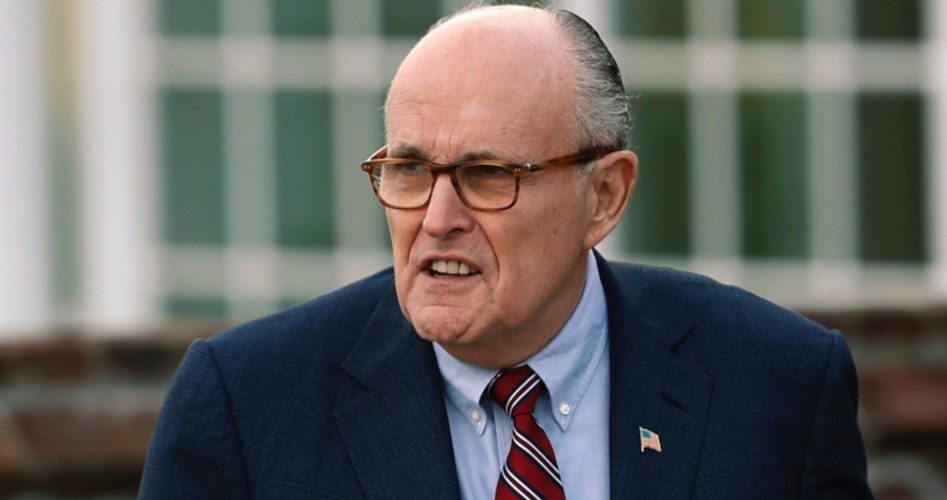
When asked by CNN’s Dana Bash, “So you think the Mueller probe is legitimate?” Trump’s attorney Rudy Giuliani (shown) responded, “Not anymore.”
Giuliani made his blunt remarks on CNN’s State of the Union program on Sunday, arguing that several things have led him to believe that the probe conducted by Special Counsel Robert Mueller is an illegitimate investigation.
“You get the [former FBI Director James] Comey thing, which is a leak of a confidential memo, which is illegal for an FBI official to do, and that becomes the basis for appointing Mueller,” Giuliani told Bash. “I’m not saying Mueller is illegitimate, I’m saying the basis on which he was appointed was illegitimate.”
Giuliani told Bash that before he joined the Trump legal team he assumed that the investigation into alleged Russian collusion with the Trump presidential campaign of 2016 was a legitimate probe. “I don’t [think the probe is legitimate]. I did when I came in but now I see Spygate.”
At this point, Bash interrupted Giuliani, arguing that Spygate — in which the Obama administration had an informant (spy) inside the Trump presidential campaign — occurred before Mueller was named. Giuliani, however, retorted, “but it has to inform the decision to appoint Mueller — either it’s evidence or not.”
“I know 50 years of investigatory experience tells me they don’t have a darn thing because they would’ve used it already and they wouldn’t be off on collusion, they wouldn’t be off on [Paul] Manafort, they wouldn’t be off on [Michael] Cohen,” said Giuliani, a former federal prosecutor under President Reagan, former mayor of New York City, and unsuccessful presidential candidate in 2008.
In other words, Giuliani said, “You’ve got a good case, man, you go right to it.”
Despite Giuliani’s insistence that Mueller’s investigation is illegitimate, he told Fox News Sunday that Trump would not fire Mueller. Instead, Giuliani said, “What we have to do is go to court and seek protection from the court.”
Giuliani is well-known both as a Republican and a long-time friend of Trump, his fellow New Yorker, and is now working as the president’s lawyer. It is to be expected that he would take up for the president. But Alan Dershowitz, a retired professor from Harvard Law School, has taken positions very similar to what Giuliani has taken on the cable news circuit. And Dershowitz is a well-known Democrat.
Dershowitz has said that Mueller is attempting to turn constitutional actions by the Trump White House into criminal actions. “The president is entitled to fire the head of the FBI. The president is entitled to direct his attorney general who to investigate, who not to,” Dershowitz has asserted. “I don’t see that the prosecutor should have a right to turn a constitutionally protected act of the president into a crime by speculating on what his motive might have been.”
Actually, the question of Mueller’s legitimacy should raise the even larger issue of whether any Special Counsel, appointed by anyone other than the president of the United States, is legitimate.
In Article II, Section 2 of the U.S. Constitution, it is clearly stated that the president shall have the power to appoint “other officers of the United States, whose appointments are not herein otherwise provided for, and which shall be established by law.” In other words, the appointment of a Special Counsel was not properly made by Assistant Attorney General Rod Rosenstein, nor even the attorney general himself, Jeff Sessions, but rather it was within the constitutional jurisdiction of the president of the United States — Donald Trump.
Oversight of the executive branch is in the hands of the legislative branch, rather in the hands of a special counsel, using a grand jury in a judicial district where the president received less than 10 percent of the vote. If the Congress believes officers of the executive branch — including the president — have misbehaved in some way, they can hold hearings, they can issue subpoenas, and demand testimony under oath. They can use the impeachment process, if warranted.
Members of Congress are subject to the voters at election time for their efforts in this regard. But with independent counsels such as Mueller, the chances of prosecutorial overreach are, if anything, much greater. The late Supreme Court Justice Antonin Scalia was troubled by the law that created the office of independent counsel (popularly referred to as “special prosecutor”). He believed it both dangerous and unconstitutional, and he was the lone dissent in the case involving the legality of the creation of independent counsels. He argued that the statute was a dangerous limitation on the executive power that would lead to prosecutors bringing politically motivated cases.
As Dershowitz has noted, “Mueller’s demonstrated zeal and ample resources virtually assure that indictments will come, even in the absence of actual crimes rather than behavior that is simply ‘politics as usual.’ If Mueller claims that Trump or members of his entourage committed crimes, it doesn’t mean that it’s necessarily so.”
So, yes, Rudy Giuliani is correct in charging that Mueller’s investigation is illegitimate, considering that a careful reading of the Constitution indicates that his very appointment by someone other than the president himself is illegitimate — and unconstitutional.
Photo: AP Images



